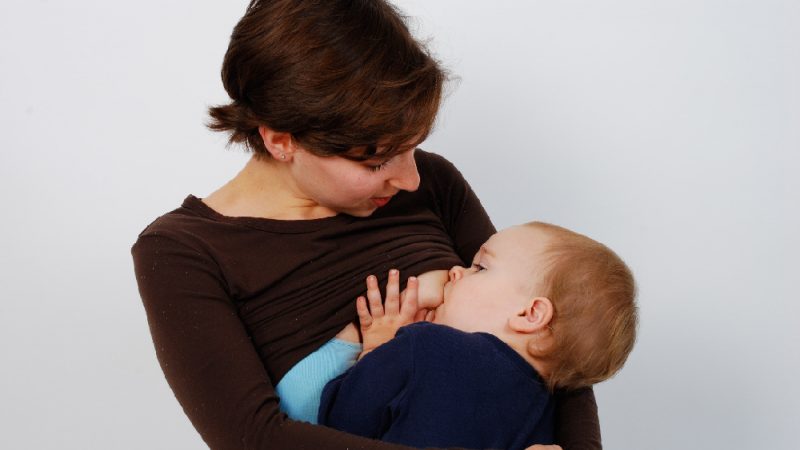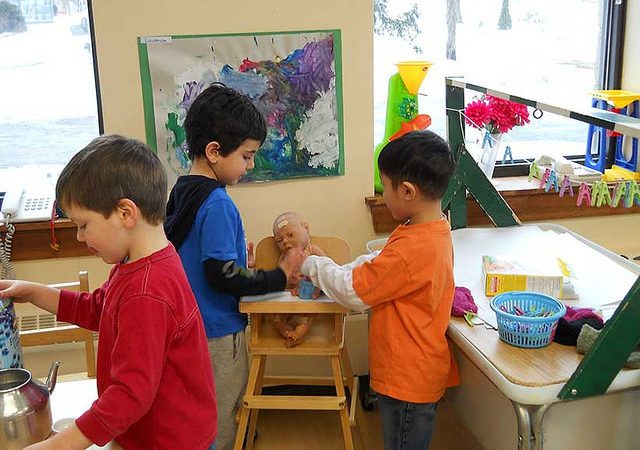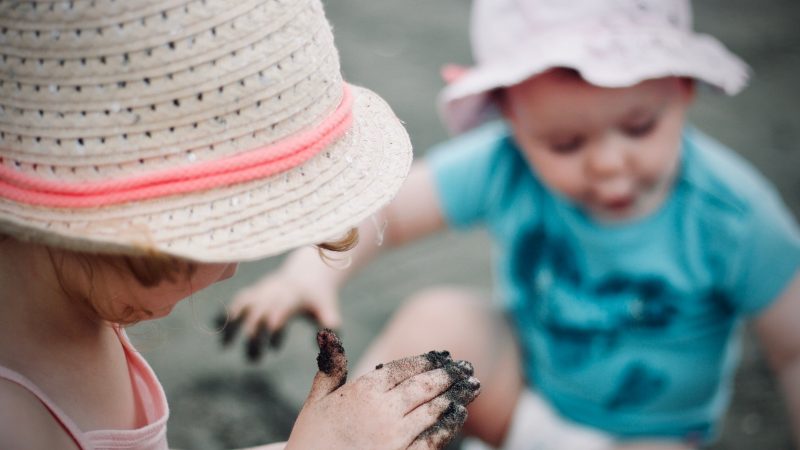
Breastfeeding – changing the conversation
 For our second online Q&A, we spoke to Heather Trickey, a breastfeeding counsellor and Research Manager for the NCT. Heather is interested in why some public health policies appear to work whilst others fail, and her PhD in infant feeding policy explores where and how intervention could be improved so that more women are able to make feeding choices easily and successfully. She is interested in how we can move from simply putting pressure on mothers to breastfeed, to removing the barriers that might prevent them from doing so.
For our second online Q&A, we spoke to Heather Trickey, a breastfeeding counsellor and Research Manager for the NCT. Heather is interested in why some public health policies appear to work whilst others fail, and her PhD in infant feeding policy explores where and how intervention could be improved so that more women are able to make feeding choices easily and successfully. She is interested in how we can move from simply putting pressure on mothers to breastfeed, to removing the barriers that might prevent them from doing so.
PSG: I understand that you encourage an ecological approach to encouraging women to breastfeed. How is this different from other approaches?
Heather: Taking an ecological approach means thinking about all the ways in which parents’ decisions are influenced or constrained, rather than focusing just on encouraging persuading mothers to breastfeed. It means thinking about all the factors that affect mother’s decisions.
If we think back to our own experiences of feeding a baby, or perhaps the experience of a friend, we tend to think of ourselves as making decisions in response to things that happen to us. In the UK many women stop feeding before they want to because they run into problems, particularly in the early days. When women tell their stories they say things like ‘the baby didn’t attach’ or ‘I ran out of milk’ or ‘my nipples were sore and cracked’ and these seem to us as individuals to be the reasons behind why things didn’t work out. We end up blaming our biology, or our relationship with the baby, or others for telling us ‘it shouldn’t hurt’. That makes sense until you draw back the lens and you see how different our experiences are depending on where we live and what our social background is.
You are much much more likely to breastfeed for longer if you live in Norway compared to the UK. Your decisions are likely to be different if you live in a smart bit of London compared to a disadvantaged Welsh Valley community; if you went to university compared to leaving school at 16; if your friends and family have experience of breastfeeding. So we are talking about culture and services not biology!
PSG: Can you give us any examples of programmes that have successfully increased BF rates?
Heather: The Baby Friendly programme is evidence-based and has been shown to be effective in improving breastfeeding rates. It’s an international programme to improve support for infant feeding from the health service.
PSG: It’s a systemic problem, right? It is unfair to task individuals with fixing this problem when society is against them.
Heather: Yes – I don’t think it’s the responsibility of individual mothers to improve our breastfeeding rates. It is our collective responsibility as a society to ensure that more mothers are able to feed their babies in the way that they want to with the support that they need.
Our health service is improving (thanks to Baby Friendly), but it’s starting from a very low base – confidence, knowledge and skills have been decimated by lack of training. Practices that undermine breastfeeding and hospital policies have been present from the inception of the NHS onwards. If you go back to midwifery manuals from the 1950s 1960s 1970s and 1980s, the standard practice was to remove the baby from the mother – this isn’t going to help breastfeeding! It’s no wonder that our society has lost confidence – many maternity care services still do not meet the minimum Baby Friendly standard for care.
PSG: Do we even stand a chance if health care providers are sponsored by formula companies?
Heather: I think we sometimes miss the fact that there is a mutli-billion dollar industry invested in women not breastfeeding. Getting buy-in from health professionals is a big part of getting breastfeeding embedded in our ecology. We need stricter controls on formula advertising to prevent mothers from being mislead into buying products that are of no benefit or unreasonably expensive, and to prevent formula milk being seen as the answer to all breastfeeding problems
PSG: There’s so much I didn’t know about breasts and breastfeeding… I think they should teach it in school.
Heather: I think schools are focused on teaching and getting children to pass the right tests at the minute, so the key would be to ensure that teaching about breastfeeding was aligned with that agenda, not a bolt-on and definitely not introduced for the first time as part of sex education! It could happen, couldn’t it? Why not as a ‘system’ in biology for example? But I think that this sort of information needs drip feeding throughout school.
PSG: Is it appropriate for those of us who do breastfeed to be proud of ourselves for doing this when culturally the odds are stacked against us? I am proud but I hide my pride. I feel guilty to voice that in fear of upsetting someone who hasn’t breastfed, be it a friend or their own mother etc. I think this makes breastfeeding a subject which isn’t spoken about in ‘more deprived’ areas
Heather: I think is natural to feel proud of something that takes effort and determination. I guess the undercurrent to the ‘Should I feel proud?’ question is ‘Will I make others feel guilty?’ That’s interesting – we don’t seem to have a language for talking about breastfeeding in the positive, so we don’t have the conversations at all.
I wonder if we were able to talk more explicitly about non-health reasons for breastfeeding whether that would help. My belief is that this is because our conversation about breastfeeding has now become so bound up in ‘health benefits’ that it’s impossible to talk about ‘pleasure’ or satisfaction or joy or closeness or just being proud… without it being heard as ‘I am doing the best thing for the health of my baby’.
PSG: I’m really interested in the idea that we sometimes focus too much on the health benefits of breastfeeding to the detriment of other advantages. Something to think about!
PSG: Is there any evidence that you think is “missing” – are there gaps in research where you feel the answers might help support women breastfeeding, or society to support women breastfeeding?
Heather: What evidence would I like to see? Well, I think a huge gap is knowing what sorts of policies are needed to make breastfeeding a realistic option in areas where currently hardly anyone breastfeeds beyond the early weeks.
PSG: What can we as individuals do, if the social and cultural setting is against BF?
Heather: I think the biggest thing we can do is to talk to one another about our experiences and try to bring a little more understanding of context into our conversations. I think as individuals we need to be more aware of all the reasons why women in the UK struggle to breastfeed for as long as they like, and to bring that knowledge into our conversations. And we need to start demanding change!
PSG: I’ve had friends say things like “I really wanted to keep breastfeeding but my milk dried up at 6 weeks”. I don’t feel it would be appropriate to say, “There’s a big growth spurt at 6 weeks. You probably just had terrible advice and support”.
Heather: It’s difficult. The key is that the experience of your friend is that her breastmilk dried up. I can understand your feelings, but that is her experience. It’s possible that with the right support at the right time many problems could be averted, but it’s not helpful to say so. In counselling mode you would listen and only give information much later when ready, but it is unrealistic to expect us all to be counsellors to one another!
PSG: I’ve noticed recently a lot of places having the Breastfeeding Friendly posters or stickers displayed. I think that goes a long way to feeling more comfortable because you know you can feed there
Heather: There is some evidence that people are more worried about the reaction they might get than the reaction they actually get, so providing a safe space to feed with positive feedback is a good start. There is also some evidence that the best experience is vicarious learning i.e. you see someone else doing it and it comes to be normal.
PSG: My mum and I had a chat about the influence of mothers on their daughters’ feeding choice. My mum fed me till 18 months, I’m still feeding my 4 year old and she wondered how long my daughter might feed her kids for one day!
Heather: Immediate family influences are tremendously important, and especially in communities where grandparents are close and often involved in the child care.
We did some research with grandparents in South Wales – we used a whole load of artefacts related to feeding babies (bottles, tins, slings etc…) and got grandparents talking about their experiences of feeding and their role in supporting their own children. Many grandparents who had had terrible support for breastfeeding and a distressing disappointing time themselves were very concerned that their own daughters shouldn’t go through that.
There is a real danger that policy makers can live in a middle class bubble, throwing up their hands in horror when Farrage makes some idiot remark about breastfeeding in Clarridges, “because it seems so unusual for anyone to complain! But a recent study in Merthyr showed that the feeling that breastfeeding out and about is unacceptable is a major barrier.
PSG: I think educating grandparents is a great idea. I know I’ve been to lots of groups where mums have said they’ve struggled with comments made by grandparents about them breastfeeding incorrectly, because the guidance has changed so much since their day.
Heather: Yes, though it needs to be done carefully. Many of the women I spoke to were still very upset about their experiences from 30 years ago – for one woman it was the first time she remembered speaking about it at all.
The work with grandparents. Trickey, H., Totelin, L. and Sanders, J., 2017. Nain, Mam and Me: Historical artefacts as prompts for reminiscence, reflection and conversation about feeding babies. A qualitative development study. Research for All, 1(1), pp.64-83. Available from: http://bit.ly/2qAAIyK
PSG: I’d love to see a campaign with a message like “This woman wants to breastfeed. Don’t suggest she give up – ask her how you can help” or “You have a right NOT to pay for substitute milk if you don’t want to”.
Heather: I think it would be really interesting to develop a long list of statement like that… and then perhaps we can think of a way of testing them in conversations…
PSG: How about “Mothers should be able to stop breastfeeding when they want to”? Let’s see if we can come up with some more.
Heather: That’d be great! I think our conversation is very very impoverished, with both mothers who bottle and breastfeed. There are so many things we feel we can’t say – it’s nuts! And it keeps the focus on us as mothers ‘blaming each other’ and not on society where it should be!
Join the conversation!
What breastfeeding statements / campaign messages would you like to see? If you post in comments below we’ll pass it on to Heather.
Related Links
Heather supplied these links after the chat
Thinking about how we might have different types of conversations about peer support. Trickey, H., 2016. Infant feeding: Changing the conversation – ecological thinking. Perspective 133
Some NCT work on how mothers feel about support for breastfeeding


